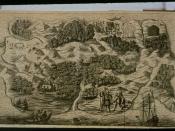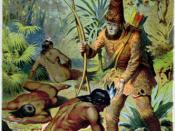The Enlightenment literature and Robinson Crusoe
Literature became more and more available to people during the 18th century due to the new invention, the Goodman press. Newspapers were very popular because they were cheap and they contained a lot of information.
Most literature was non-fiction, it wasn't based on the imagination of the author. The aim of writings of the time was to instruct and enlighten, and most of all, get people to think. It was believed that reason and fact show life as it is, while imagination and non-fiction tell how people hope or fear reality to be.
It was thought at the time that God had created man in His image, therefore people had a share of his powers. In other words, by painting, writing and practising one's intellectual powers, the artist or scholar was fulfilling divine purposes. The goal was to capture the pride, the spirit and creativity of the ancient Greeks and by that to satisfy and please God.
Also the admiration of the human race was part of Enlightenment thought.
Robinson Crusoe is in many ways an untypical Enlightenment book. Robinson's religious interests are a very good example of this; first Robinson practically makes fun of God, praying for Him to save him and promising to go home if he gets out of this trouble. After the danger is over, he doesn't think twice about it. But after he's lived on the island for some time, he finds a Bible and becomes Christian. The Enlightenment people realized that there were many civilizations that didn't believe in Christ and still had flourishing culture and life. A typical Enlightenment-book would have told how he gets saved even without faith and as consequence of that, you don't need faith to conquer your troubles.
The Enlightenment was an...


